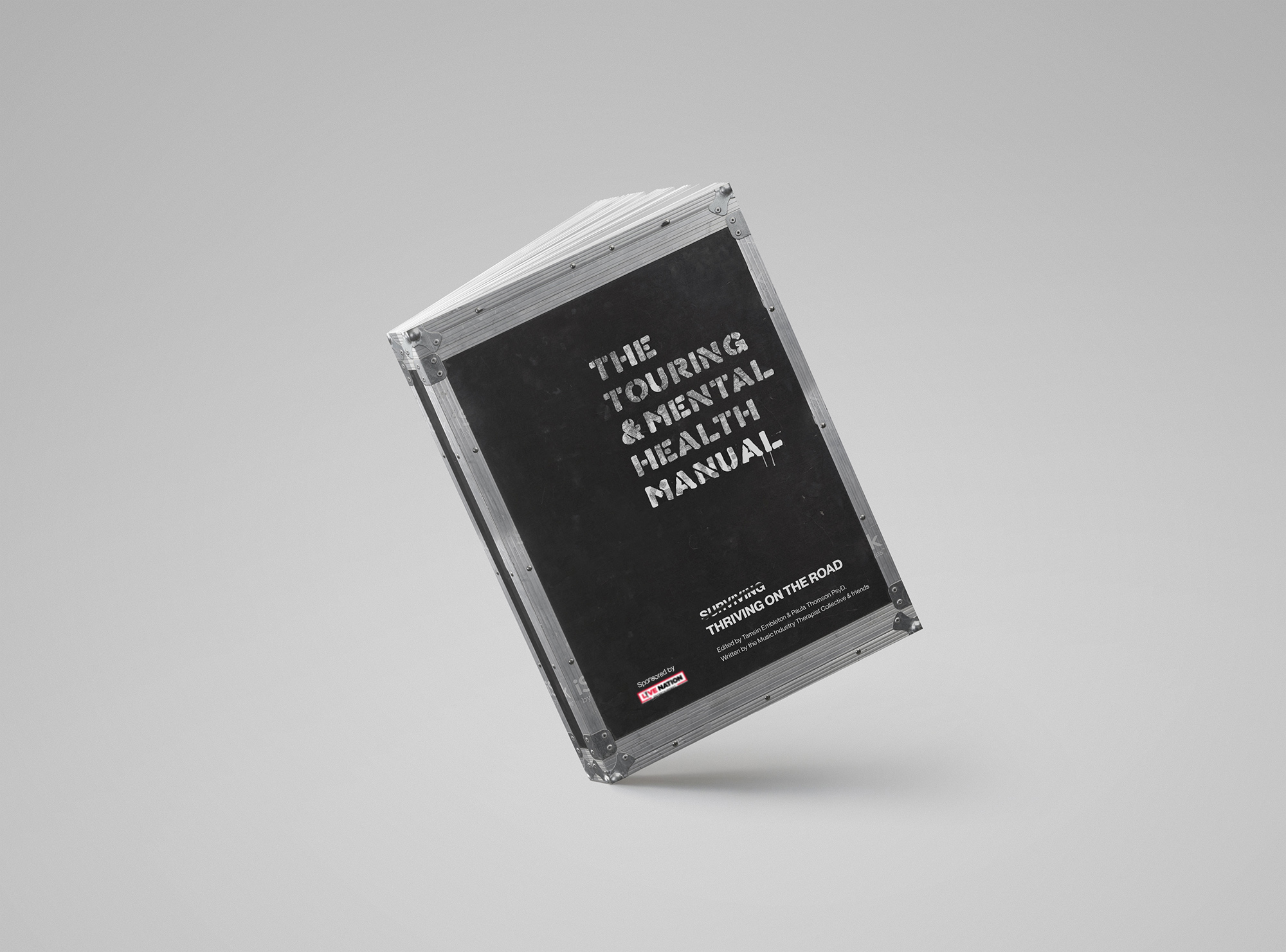Jodi Milstein has witnessed plenty of carnage in the music industry.
"I know the language, I understand the lifestyle of what it's like to tour, when you pull into a city at 2 a.m. and sleep on the bus," she says. "I doubt many [other therapists] can understand that."
Milstein, you see, isn't a guitarist, a tour manager, or a record producer, but she's still essential to the artists she works with. She's a therapist—more specifically, a therapist for bands. Jodi is part of a movement that provides quality mental health assistance to musicians who'd prefer a specialist that knows their world; someone who doesn't have to imagine what it feels like when the van breaks down, or when the booker shorts the fee, or when your drummer is being a dick, or when you're dazed with the flu and need to be on stage in an hour.
She got her start in the 90s with a job at A&M Records, where she worked directly with artists like Soundgarden, Gin Blossoms, KoRn, Sheryl Crow, and Blues Traveler. In that time—the heat of the alt-rock, FM radio era—she was surrounded by friends, clients, and colleagues who struggled with addiction; some who are still with us, and some who were eventually claimed by their afflictions.
This is the sort of context that frames the hedonistic excess of pop music against the morbid forces of gravity, and Milstein wanted to help. She imagined a position in the industry under a different, more soulful guise, and returned to college to earn her Master's in Clinical Psychology. In 2008, she broke ground on her own Los Angeles therapy practice that focused on the type of musicians she used to manage. It's called RockStar Therapy; built by, and for, those who feel burnt out by the music business.

There's not a huge base of academic literature on band therapy. Freud never put, say, Bing Crosby on the couch, and we've yet to scientifically uncover what a two-nighter in Cleveland does to your serotonin receptors. So Milstein's doctrine belongs to herself, and the small network of other rockstar-specific practitioners who make up the Music Industry Therapist Collective—each of whom are professionally licensed, and like Milstein, have a background in the professional, non-prescriptive side of the record business.
Their motivations are clear. Linkin Park's Chester Bennington and Soundgarden's Chris Cornell are just two examples of recent tragic, high-profile suicides within the industry. The insurgent wave of emo rap has been marked by the drug-related deaths of Lil Peep and Juice WRLD, and there's mounting composite evidence that musicians die earlier and suffer from exceptionally high rates of anxiety and depression.
Milstein's specialization becomes particularly relevant when she welcomes a full-fledged band, rather than an individual artist, to her office. Bands are a cerebral vortex; a simmering web of friendships and working partners, with egos of fluctuating size and authority. It's plenty for any psychologist to chew on. Milstein says it's similar to family therapy, only with more money on the line.
"They live with each other, they have to tolerate each other, and they have good times and difficult times," she explains. "There's usually some kind of hierarchy in a band, it's rarely split equally, you look at the people who are the most influential in a band, and how to make sure they're respecting the other adults in the group. Some bands are more feelings-oriented. Some bands have members that want to be in therapy, and some think it's ridiculous. And you have to remember that it's a business. There's a whole machine behind these people in my office. So how do we continue their success, or build on that success?"
A version of what Milstein is talking about was dramatically captured in the 2004 Metallica documentary Some Kind of Monster. It remains a fascinating watch. These aging Gen X dads, still stinging from the departure of their bassist Jason Newsted, hire the services of a "therapist/performance enhancement coach" named Phil Towle. Over the course of the film, we watch the world's marquee metal band fess up to giant, petty wads of vulnerable baggage—revealing the sort of bruised feelings and jealousies that you'd never expect to befall the mighty Metallica. (They eventually get it together of course, though St. Anger wasn't their best moment.)
Obviously every band and artist is different, and Milstein ethically can't disclose the people who've passed through her practice, but another member of the Music Industry Therapist Collective, Tamsin Embleton, tells me that a cocktail of pressure, creativity, and exhaustion—a microcosm of what beared down on Hammett, Hetfield, and Ulrich—follows the artists who make it to her practice.

"The music industry is unpredictable, competitive and turbulent. Job insecurity is rife. There’s a sense that you need to remain outwardly grateful, even if you’re struggling, because there’s always someone hot on your heels who wants your job," she says. "Creators have the pressure to create something new and relevant, and also to gain and maintain success. In order to do that they need to expose their art for evaluation and critique from A&Rs, music critics, and fan-bases all with sets of expectations."
But for as much havoc as the creative process can wreak, Embleton tells me that there's no good analogue for touring and the physical demands of the road. She explains that cortisol levels—the body's main stress hormone—peak so high during a musician's live performance that it can be reliably compared to skydiving. Hitting the stage is tough and nervy, but the let-down afterwards, when you're offstage and immediately severed from that energy, can be overwhelmingly lonely.
"Imagine that night after night," she says. "The body doesn’t get much time to recover, sleep can be poor quality, emotions are amplified and you’re away from support networks, self-care routines, and all the things that help to make you feel grounded."
Will Keen, a DJ and producer from England, can speak about that experience firsthand. He describes his low point as being in a very "anxious state of mind," where it felt like his health, happiness, and interpersonal relationships were all taking a backseat to, in his words, "The pursuit of progression and perfection at all costs." It's classic artistic self-destructive behavior—the inability to see the forest for the trees in the middle of an interminable grind. But thankfully his label, Hospital Records, put him in contact with Music Minds Matter, a hotline armed with specialists who understand the unique burdens of the record industry,
"I had six weeks of cognitive behavioral therapy sessions lined up only days after making first contact with Music Minds Matter," he says. "From touring DJs to pop stars, everyone has their issues. It was particularly powerful for me because I didn't have to explain why I felt so passionately about the decisions that lead me to that moment. The therapist just got it. My music is my life and having someone with a shared knowledge of the touring lifestyle proved invaluable."
Keen envisions a community where everyone making music is fully aware of the curative tools available to them.

"Our lifestyle is not always conducive to good mental health," he adds. "It's important for musicians to know that changing those instinctive behaviors is not as challenging as it may look."
Maybe it seems strange that a tide of therapists are treating artists as their own exclusive demographic, I mean, does that mean every occupation deserves its own corresponding set of practitioners? But Embleton reports that some of her clients have gone to more traditional therapists who have encouraged them to leave the business altogether. They simply could not understand how anyone could survive within the industry's dysfunction, and "misunderstand the motivation to create and perform, and how deeply healing and connecting it can be."
At the very least, band therapy offers the chance to be heard by someone who knows why it's all worth it.
"[Band therapy] might work, and it might not," finishes Milstein. "But it's something to say this [career] means enough to do what they can."
from VICE https://ift.tt/35vklmJ
via cheap web hosting
No comments:
Post a Comment